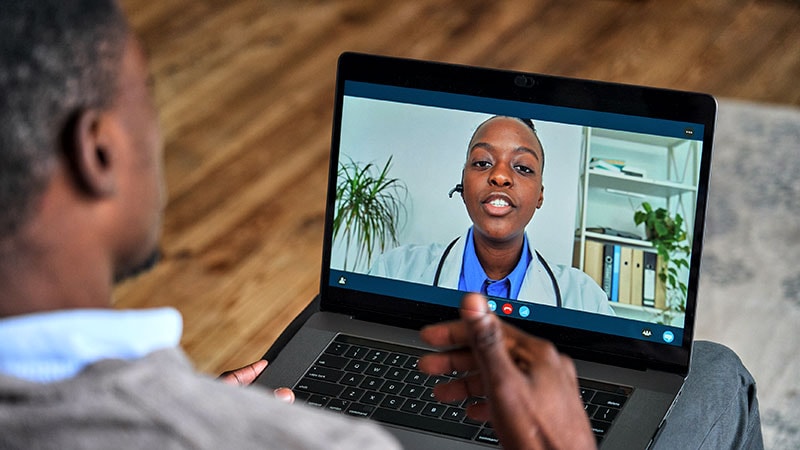TOPLINE:
A mobile health intervention that combines remote and in-person contact with clinical pharmacists and health coaches appears to improve blood glucose levels, indicates a study of urban Black American and Latinx patients with type 2 diabetes and increased A1c values.
METHODOLOGY:
-
The mHealth for Diabetes Adherence Support (mDAS) trial involved adult urban Black American and Latinx individuals with type 2 diabetes and A1c levels of ≥8.0% at an academic medical center.
-
Between March 23, 2017, and January 8, 2020, they were randomly assigned to undergo a mobile health diabetes intervention or usual care. At 1 year, the patients swapped over and were followed up for a second year.
-
The intervention included remote video review of glucose levels and medication intensification by clinical pharmacists as well as in-person health coaching, which included addressing barriers to medication use.
TAKEAWAY:
-
Among 221 participants (mean age, 55.2 years; 69.7% women), the mean baseline A1c was 9.23%. The majority (67.0%) were Black patients, and 58.8% had fair or poor health.
-
The 1-year improvement in A1c levels in comparison with baseline was significantly greater in the intervention group, at -0.79 vs -0.24 with usual care (treatment effect, -0.62; P = .005).
-
A1c levels improved significantly in year 2 among control patients who switched to the intervention group, at a mean change from year 1 of -0.57 (P = .002). In the original intervention group, improvements were maintained (P = .35).
-
The findings remained significant after controlling for baseline covariates, and there were no dose-response relationships, as determined on the basis of the number of pharmacist and health coach encounters.
IN PRACTICE:
“This randomized clinical trial found that a clinical pharmacist and health coach–delivered mHealth intervention improved A1c levels in African American and Latinx patients with type 2 diabetes over 1 year compared with usual diabetes care. Importantly, improvements were maintained at 24 months. Based on these findings, this mHealth driven intervention may be considered an effective approach to improving blood glucose management in racial and ethnic minority patients with primary care access in urban environments.
“The rationale for implementing an approach in which pharmacists, health coaches, and telehealth work together is compelling,” the team writes.
The team points out that challenges “remain for health coach integration within health care organizations, including supervision and health record documentation”; this “may modify their role as an independent community-based supporter to become a medicalized social service.”
SOURCE:
The research was conducted by Ben S. Gerber, MD, MPH, Population and Quantitative Health Sciences, University of Massachusetts Chan Medical School, Worcester, Massachusetts, and colleagues. It was published in JAMA Network Open on September 29.
LIMITATIONS:
The authors emphasize that the results may not be generalizable to other healthcare environments and that it was impossible to determine the contribution of individual elements of the mobile health intervention to the change in A1c levels. They could also not identify an underlying mechanism to explain the results. Furthermore, most patients did not achieve their A1c goal, and there were no significant improvements in key secondary outcomes after adjustment.
DISCLOSURES:
The study was supported by grants from the National Institute of Diabetes and Digestive and Kidney Diseases and a grant from the National Heart, Lung, and Blood Institute. The REDCap platform was supported by a grant from the Center for Clinical and Translational Science, the University of Illinois Chicago. Gerber received grants from the National Institute of Diabetes and Digestive and Kidney Diseases and the National Heart, Lung, and Blood Institute during the conduct of the study outside the submitted work. His spouse is employed by Abbott Laboratories, which manufactures a continuous glucose monitoring system that was mentioned in the article. Other authors have also disclosed relationships with industry.
JAMA Netw Open. Published online September 29, 2023. Full text
For more news, follow Medscape on Facebook, X, Instagram, and YouTube.
Source: Read Full Article
